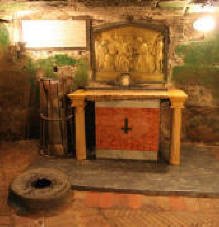|
Treasures of the Church- Holy Sites |
mamertine prison
by SCTJM
St. Peter, the first pope, was
imprisoned on 2 separate occasions during his 25 years reign as the
Vicar of Christ. It is believed that St. Peter was kept in the Mamertine Prison, at the base of the Capitoline Hill in Rome, during
his second Roman imprisonment. In this prison many famous historical
personages were executed, before entering the prison there is a long
list of Christian martyrs who died there. Access to the prison was
through a hole in the ceiling, above the prison was a room for the
prison guards.
Church tradition states that Peter performed a miracle by causing
water to gush from a cell wall to quench the thirst of prisoners and
also to baptize converts, including two jailers. Today this spring
of water is situated next to the altar. While imprisoned there, Paul
is also believed to have written some of his most impassioned
letters to the early Christian church. Unafraid of dying, he sent a
message from his prison cell: I have fought the good fight. I have
finished the race. I have kept the faith. In another instance he
wrote At my first defense no one took my part; all deserted me. May
it not be charged against them! (2 Timothy 4:16; see also vs.
9-13).
The pious Eudocia, wife of Emperor Teodosio II, journeyed to
Jerusalem and found the chain that had bound Peter during his second
imprisonment. According to the Acts of the Apostles (12:6), an angel
caused the chains to fall from Peter's hands and led him past
slumbering guards to freedom.
The chain was eventually given as a gift to Pope St. Leo the Great
(440-461). In Rome there was already a chain that was greatly prized
which had bound the saint during his nine month imprisonment in the
Mamertine Prison near the Forum. When the pope compared the two
chains, they miraculously fused together into one unbreakable series
of links. Because of this miracle, Empress Eudocia built the
Basilica of Saint Peter in Chains, and dedicated it to the apostle
in the year 442. The relic is now kept in a golden urn beneath the
high altar, close to the famous statue of Michelangelo's Moses.
Back to the
Main Page on Treasures of the Church
This page is the work of the Servants of the Pierced Hearts of Jesus and
Mary
Copyright © 2006- SCTJM
|